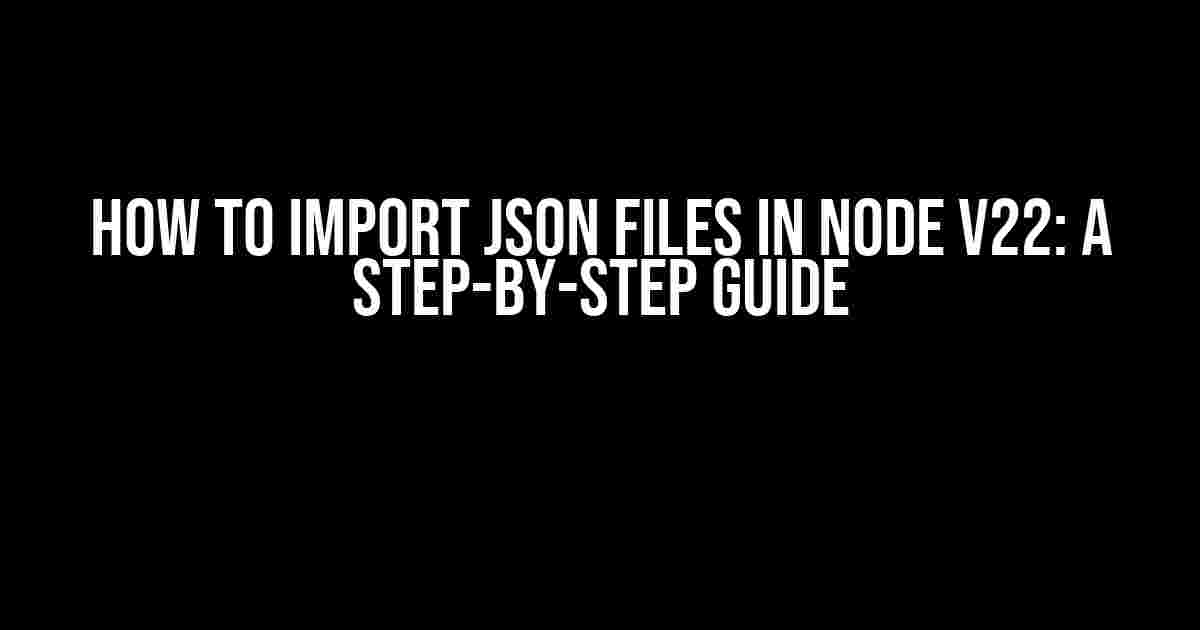Welcome to our comprehensive guide on importing JSON files in Node v22! If you’re looking for a straightforward and easy-to-follow tutorial on how to get started with JSON files in Node.js, you’re in the right place.
What is JSON and Why Do We Need It?
JSON (JavaScript Object Notation) is a lightweight data interchange format that is easy to read and write. It’s a popular choice for exchanging data between web servers, web applications, and mobile apps. In Node.js, JSON files are used to store and retrieve data in a structured format.
- Allow for easy data exchange between servers and clients
- Provide a human-readable format for data storage and retrieval
- Are platform-independent, making them compatible with multiple programming languages
- Support hierarchical data structures, making them ideal for complex data sets
Importing JSON Files in Node v22: The Basics
Now that we’ve covered the basics of JSON, let’s dive into importing JSON files in Node v22. There are two ways to import JSON files in Node.js:
Method 1: Using the `require` Function
The `require` function is a built-in Node.js function that allows you to load JSON files as modules. Here’s an example:
const jsonData = require('./data.json');
console.log(jsonData); // outputs the contents of data.jsonIn this example, we’re importing a JSON file named `data.json` located in the same directory as our Node.js file. The `require` function returns the contents of the JSON file as a JavaScript object.
Method 2: Using the `fs` Module and `JSON.parse()`
The `fs` module is a built-in Node.js module that allows you to read and write files. We can use it to read a JSON file and then parse it using the `JSON.parse()` function. Here’s an example:
const fs = require('fs');
const jsonData = fs.readFileSync('./data.json', 'utf8');
const data = JSON.parse(jsonData);
console.log(data); // outputs the contents of data.jsonIn this example, we’re using the `fs` module to read the contents of `data.json` and store it in the `jsonData` variable. We then use the `JSON.parse()` function to convert the JSON string to a JavaScript object.
Importing JSON Files with ES6 Imports
In Node v22, you can also use ES6 imports to import JSON files. Here’s an example:
import jsonData from './data.json';
console.log(jsonData); // outputs the contents of data.jsonIn this example, we’re using the `import` statement to import the `data.json` file. The `import` statement returns the contents of the JSON file as a JavaScript object.
Handling Errors and Exceptions
When importing JSON files in Node v22, it’s essential to handle errors and exceptions. Here are some common errors you may encounter:
| Error | Description |
|---|---|
| ENOENT | Error thrown when the JSON file is not found |
| EISDIR | Error thrown when the path is a directory, not a file |
| JSON.parse() error | Error thrown when the JSON file contains invalid JSON syntax |
To handle these errors, you can use try-catch blocks and add error-handling logic. Here’s an example:
try {
const jsonData = require('./data.json');
console.log(jsonData);
} catch (err) {
if (err.code === 'ENOENT') {
console.error('JSON file not found');
} else if (err.code === 'EISDIR') {
console.error('Path is a directory, not a file');
} else {
console.error('Invalid JSON syntax');
}
}Best Practices for Importing JSON Files
Here are some best practices to keep in mind when importing JSON files in Node v22:
- Use a consistent naming convention: Use a consistent naming convention for your JSON files, such as `data.json` or `config.json`.
- Keep JSON files separate from code files: Keep your JSON files separate from your code files to avoid clutter and make maintenance easier.
- Use the correct file path: Make sure to use the correct file path when importing JSON files. Use relative paths instead of absolute paths to make your code more portable.
- Handle errors and exceptions: Always handle errors and exceptions when importing JSON files to ensure that your code is robust and reliable.
- Validate JSON data: Validate JSON data before using it to ensure that it’s in the correct format and contains the expected data.
Conclusion
Importing JSON files in Node v22 is a straightforward process that requires a basic understanding of JSON and Node.js. By following the instructions and best practices outlined in this guide, you’ll be able to import JSON files with ease and confidence. Remember to handle errors and exceptions, use consistent naming conventions, and validate JSON data to ensure that your code is robust and reliable.
Happy coding!
Frequently Asked Question
Got stuck while importing JSON files in Node v22? Don’t worry, we’ve got you covered! Here are the most frequently asked questions and answers to get you started.
Q1: How do I import a JSON file in a Node.js project?
You can import a JSON file in Node.js using the `require` function. For example, if you have a file named `data.json`, you can import it using `const data = require(‘./data.json’);`. This will load the JSON data into the `data` variable.
Q2: What if my JSON file is in a different directory?
No problem! You can specify the path to the JSON file using a relative or absolute path. For example, if your JSON file is in a directory named `config`, you can import it using `const data = require(‘./config/data.json’);`. If it’s in a parent directory, you can use `const data = require(‘../data.json’);`.
Q3: How do I parse a JSON file in Node.js?
When you use `require` to import a JSON file, Node.js will automatically parse the JSON data into a JavaScript object. However, if you need to parse a JSON string manually, you can use the `JSON.parse()` method. For example, `const jsonData = ‘{“name”: “John”, “age”: 30}’; const data = JSON.parse(jsonData);`.
Q4: Can I import a JSON file using ES6 imports?
Yes, you can import a JSON file using ES6 imports, but you need to use the `import` keyword with the `type` option set to `”json”`. For example, `import { data } from ‘./data.json’ assert { type: ‘json’ };`. Note that this syntax is only supported in Node.js 14 and later versions.
Q5: What if my JSON file is very large?
If your JSON file is very large, you may want to consider using a streaming JSON parser, such as `json-stream`, to parse the file in chunks. This can help prevent memory issues and improve performance. Additionally, you can use techniques like data compression and caching to optimize the import process.




